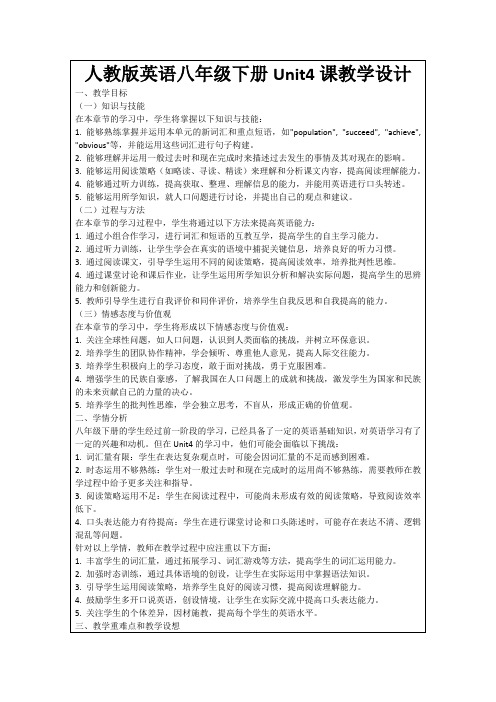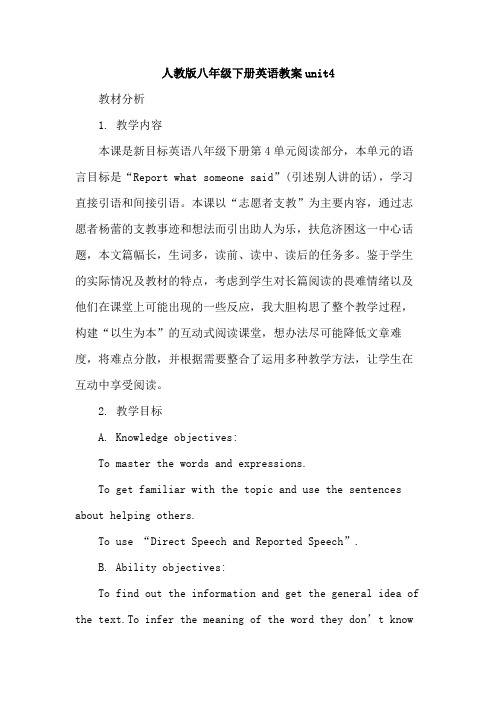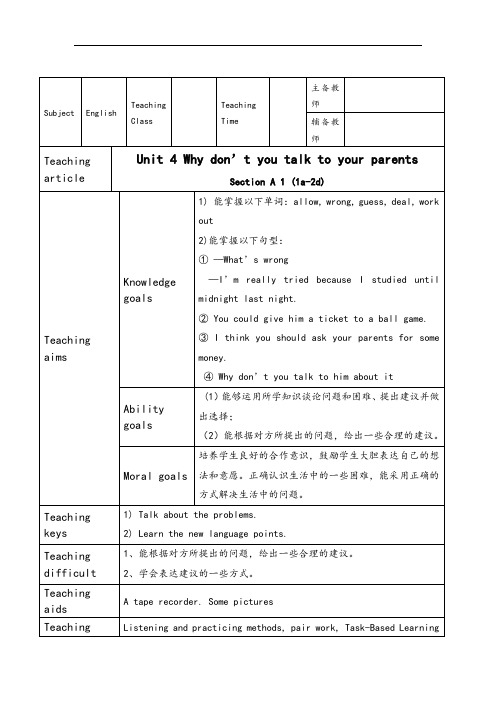新人教版八年级英语下册unit4全单元教案
新人教版八年级英语下册Unit4(1)教案

新人教版八年级英语下册Unit4(1)教案
教学目标
1. 通过本节课的研究,学生能够掌握以下单词和短语:[列出
单词和短语]
2. 学会使用本节课所学的单词和短语进行描述和对话。
3. 通过听力训练和口语练,提高学生的听说能力。
教学重点
1. 掌握本节课所学的单词和短语。
2. 能够运用所学的知识进行简单的对话和描述。
教学过程
1. 导入新知:用图片展示本节课的话题,并引导学生进行讨论。
激发学生的研究兴趣。
2. 单词和短语研究:通过多种方式教授本节课所学的单词和短语,如图片、动作、例句等。
并进行相关练。
3. 听力训练:播放相关录音并让学生进行听写和理解,培养学
生的听力能力。
4. 对话练:学生分组进行对话练,通过角色扮演的方式实践所
学内容。
5. 练巩固:进行相关练题,以检验学生对所学内容的掌握情况。
6. 课堂小结:总结本节课的重点内容和要点,并指导学生进行
自主研究。
教学评价
1. 通过观察学生的听说表现以及练题的完成情况,评估学生对
所学内容的掌握程度。
2. 及时反馈学生的研究进展,鼓励他们继续努力。
扩展延伸
1. 鼓励学生使用本节课所学的语言进行日常交流,并给予积极
的反馈和指导。
2. 提供更多相关的阅读材料和听力练,以拓展学生的语言技能。
教学资源
1. 课件和图片
2. 录音设备
3. 练题册。
2023-2024人教版英语八年级下册大单元整体教学设计【新课标】Unit 4 Why don't

能理解和掌握含有连词until,athough.so that的相关表达个人困扰的句子。
Period 3
Section A
2d + F-4c)
1.学生通过学习词汇详解,学习本课时新单词和短语。
3.能够学会在语境中感悟或体会词汇含义,找出意思相近或相同的语言表达。
课时教学目标
Period 1
Section A 1a-2c
能初步使用“should ”“why don’t you...?”谈论表达个人建议。
能简单地谈论青少年在人际交往中遇到的困扰,并能说出自己的观点。
Period 2
Section A 3a-3c
1.归纳、梳理了本单元的重要句式结构和语法。
2.强化和巩固本单元目标语言。
1.选词填空。对连词表意功能的理解和运用。
2.写出完整的表达建议的句子。
3.开放性较强的口语交际活动,训练学生对所学语言内容的实际运用能力。
Period 4
听说
课
1a-1b融入新的词汇,让学生能够使用更丰富的语言表达来描述遇到的压力,讲述他们舒缓压力的方式,1c-1d进一步巩固单元所学的语法知识,强化连词的运用意识;1d体现了词块学习的特点;1e是一个全开放式口语实战演练,学生就三个小话题展开讨论,给出舒缓压力的建议。
思维
品质
通过听说读看写等训练,能够准确表达人际关系中的问题与建议。使学生能够正视自己的问题,养成不逃避乐观宽容大度慷慨的个人品性,培养良好的人际关系。在此基础上联系自身实际,实现知识与思维能力的迁移。
人教版英语八年级下册Unit4课教学设计

3.通过阅读课文,引导学生运用不同的阅读策略,提高阅读效率,培养批判性思维。
4.通过课堂讨论和课后作业,让学生运用所学知识分析和解决实际问题,提高学生的思辨能力和创新能力。
5.教师引导学生进行自我评价和同伴评价,培养学生自我反思和自我提高的能力。
2.利用例句和情景,引导学生学习一般过去时和现在完成时的用法,让学生在实际语境中感受这两种时态的区别和联系。
3.以课文为载体,教授阅读策略,如略读、寻读、精读等,帮助学生更好地理解课文内容。
4.对课文中的重点句子进行分析,让学生学会运用所学语法知识进行句子构建。
(三)学生小组讨论,500字
在学生小组讨论环节,我将组织以下活动:
2.语法练习:完成一般过去时和现在完成时的语法练习题,要求学生能够准确运用这两种时态描述过去的事情及其对现在的影响。
提示:学生可以通过写作或口头练习来巩固时态的运用。
3.阅读练习:阅读一篇关于人口问题的短文,运用课堂所学的阅读策略,如略读、寻读、精读,提高阅读理解能力。并回答相关问题。
提示:学生可以总结文章的主要观点,并用自己的话进行复述。
3.阅读策略运用不足:学生在阅读过程中,可能尚未形成有效的阅读策略,导致阅读效率低下。
4.口头表达能力有待提高:学生在进行课堂讨论和口头陈述时,可能存在表达不清、逻辑混乱等问题。
针对以上学情,教师在教学过程中应注重以下方面:
1.丰富学生的词汇量,通过拓展学习、词汇游戏等方法,提高学生的词汇运用能力。
6.家庭作业:要求家长参与,让学生向家长介绍本节课所学的知识,并讨论家庭所在地区的人口问题。
提示:家长可以提问,促进学生思考和表达,同时加强家校合作。
人教版初中八年级英语下册第四单元Unit 4 教案含教学反思

Section A 单词allow v.允许;准许wrong adj.有毛病;错误的guess v.猜测;估计deal n.协议;交易relation n.关系;联系;交往communication n.交流;沟通argue v.争吵;争论cloud n.云;云朵elder n.年纪较长的instead adv.代替;反而;却whatever pron.任何;每一nervous adj.焦虑的;担忧的offer v.主动提出;自愿给予proper adj.正确的;恰当的secondly adv.第二;其次communicate v.交流;沟通explain v.解释;说明clear adj.清楚易懂的;晴朗的copy v.抄袭;模仿;复制;复印return v.归还;回来;返回anymore adv.(常用于否定句和疑问句句末)再也(不);(不)再短语look through快速查看;浏览big deal重要的事work out成功地发展;解决get on with和睦相处;关系良好句型1.Many of them are learning exam skills so that they can get into a good high school and later a good university.他们中很多人正在学习应试技巧以便能考入一所好高中,进而升入一所好大学。
2.The Taylors are a typical American family.泰勒家就是一个典型的美国家庭。
3.And they are always comparing them with other children.而且她们总是将自己的孩子和别的孩子相比较。
语法although, so that及until引导的状语从句知识目标掌握课文中的重点词汇及相关短语,并灵活运用。
能力目标学会谈论问题和给出建议情感目标遇到问题要主动地去和家人、朋友或亲近的人交流;如果身边的人遇到问题,能主动提供帮助;要学会放松、缓解压力。
人教版八年级下册英语教案unit4

人教版八年级下册英语教案unit4教材分析1. 教学内容本课是新目标英语八年级下册第4单元阅读部分,本单元的语言目标是“Report what someone said”(引述别人讲的话),学习直接引语和间接引语。
本课以“志愿者支教”为主要内容,通过志愿者杨蕾的支教事迹和想法而引出助人为乐,扶危济困这一中心话题,本文篇幅长,生词多,读前、读中、读后的任务多。
鉴于学生的实际情况及教材的特点,考虑到学生对长篇阅读的畏难情绪以及他们在课堂上可能出现的一些反应,我大胆构思了整个教学过程,构建“以生为本”的互动式阅读课堂,想办法尽可能降低文章难度,将难点分散,并根据需要整合了运用多种教学方法,让学生在互动中享受阅读。
2. 教学目标A. Knowledge objectives:To master the words and expressions.To get familiar with the topic and use the sentences about helping others.To use “Direct Speech and Reported Speech”.B. Ability objectives:To find out the information and get the general idea of th e text.To infer the meaning of the word they don’t knowfrom the context.C. Affective objectives:Students are to realize the importance of helping others and they are encouraged to help others.Students’ team spirit will be improved by completing a certain task together.By understanding the life in rural areas, students are to realize how happy they are.3. 教学策略:(1)兴趣激发策略。
新人教版八年级英语下册unit4全单元教案

Teaching proceduresTeaching proceduresTeaching proceduresStep 1 Warming- up and revision1. Have a dictation of the new words learned in the last class.1.make sth. clear (同义词) ___________2.talk (同义词) _______________3.not allow (同义词) ______________4.worried (同义词) ______________5.get along with (同义词) ____________municate (名词)_____________7.old (比较级) _______________2. Check the homework.Step 2 Grammar Focus.Step 3 Try to Find一、提出建议1.掌握提出问题的方法,What’s wrongWhat’s the matter with sb. What’s the problem/the trouble并能讨论所给出的建议。
情态动词should, should等should,shouldn’t “(不)应该”,常用来提出请求和建议could “可以”可也用来给出建议。
表建议的句型:You should/could +v.Why don’t you + v.Why not + v.Could you please + v.You’d better (not) + v..Would you mind doing……What about/How about + n./doing…… Exercise:用所给单词的适当形式填空1. We shouldn’t_______ (argue) with our parents.2. You shouldn’t____ (use) the phone in the classroom.3.—could I use your dictionary—well, you___.A. canB. couldC. shouldD. might’d better___(go) to school by bike.about_________(go) hiking this afternoonStep 4 PracticeWork on 4a:1. Fill in the blanks with although, so that or until.2. 方法指导:Step 5 Giving advice.Work on 4c.1. 让学生们阅读表格中的问题,明确每个问题的意思,为进行讨论做好准备。
人教版八年级下册英语Unit4单元教案
教学
环节
教学活动
设计意图
(或复备建议)
教师活动
预设学生活动
Step 1Greeting
Check homework
Coach
Step 2
Ask: Do you have any problems? How do you deal with them?
Present 3a and give tasks
人教版八年级下册英语Unit4单元教案
年级
八年级
学科
英语
主备教师
复备教师
课题
Unit 4 Why don’t you talk to your parents ?
课型
课时
教材及课标分析
通过确定目标语言,采用听说读写自我检测等手段,有效提高语言习得者学习效率
有利于语言输出,体现了以学生为主体的思想。
学情分析
Review
教学活动过程设计(第3课时)
教学
环节
教学活动
设计意图
(或复备建议)
Hale Waihona Puke 教师活动预设学生活动Greeting
Step 1Check homework
Ask Ss say their answers
Step 2 (1a 1b )
Ask;When you have stress, what do you do?
Page 32 3b
Self check 2
Discuss and complete 2a
Listen carefully and understand
Read and answer the questions
Read and translate
人教版八年级下册英语unit4教案及教学反思
人教版八年级下册英语unit4教案及教学反思全文共3篇示例,供读者参考篇1Unit 4 of the People's Education Press Eighth Grade English textbook is focused on the theme of "Hobbies". This unit aims to help students talk about their own hobbies and interests, as well as learn how to express preferences and opinions.Teaching Objectives:1. Enable students to talk about their hobbies and interests in English.2. Introduce vocabulary related to different hobbies.3. Teach students how to express preferences and opinions.4. Improve students' listening, speaking, reading, and writing skills.Teaching Procedures:1. Warm-up activity: Start the lesson by asking students to share their hobbies with the class. This will help to activate their prior knowledge and create a positive learning atmosphere.2. Vocabulary introduction: Introduce key vocabulary related to hobbies, such as "painting", "cooking", "playing sports", etc. Use pictures, gestures, and realia to help students understand and remember the new words.3. Listening comprehension: Play a listening passage where people talk about their hobbies. Students listen and then answer comprehension questions to check their understanding.4. Speaking practice: Divide the class into pairs or groups and ask them to discuss their own hobbies, using the vocabulary they have learned. Encourage students to ask questions and share their opinions with each other.5. Reading activity: Give students a reading passage about different hobbies and ask them to identify key information, such as the benefits of each hobby and how to get started.6. Writing task: Ask students to write a short paragraph about their favorite hobby, describing why they enjoy it and how it makes them feel. Provide feedback on their writing to help improve their language skills.7. Role-play activity: Divide students into pairs and give them a role-play scenario where they discuss their preferencesfor different hobbies. This will help them practice expressing opinions and using the target vocabulary.8. Review and assessment: End the lesson with a review of key vocabulary and concepts covered in the unit. Administer a quiz or speaking activity to assess students' understanding and progress.Teaching Reflection:Overall, teaching Unit 4 on Hobbies was engaging and effective. The activities helped students practice speaking, listening, reading, and writing skills in a fun and interactive way. However, one area for improvement is to provide more opportunities for students to use the target language in real-life contexts. For example, incorporating project-based learning tasks where students create a hobby-themed presentation or video could further enhance their language proficiency.In conclusion, Unit 4 provided a valuable opportunity for students to explore their interests and hobbies in English. By incorporating a variety of activities and assessments, teachers can help students achieve the learning objectives and improve their English language skills.篇2Unit 4 of the People's Education Edition eighth grade English textbook covers the topic of "Wild Animals". In this unit, students will learn vocabulary related to wild animals, practice reading and listening skills through various texts, and improve their ability to describe animals and discuss their habitats.Lesson 1:- Warm-up: Start the lesson by asking students to name different wild animals they know.- Vocabulary: Introduce new vocabulary words related to wild animals such as lion, elephant, tiger, etc.- Reading: Read a short passage about different wild animals and ask students comprehension questions.- Listening: Play a recording of different animal sounds and ask students to match the sound with the correct animal.- Speaking: Have students describe their favorite wild animal and why they like it.Lesson 2:- Warm-up: Review the vocabulary words from the previous lesson by playing a matching game.- Reading: Read a longer passage about a safari trip and ask students to identify the animals mentioned in the text.- Grammar: Introduce comparatives and superlatives using examples related to wild animals (e.g. The elephant is bigger than the giraffe).- Speaking: Have students work in pairs to discuss which animal they think is the most interesting and why.Lesson 3:- Warm-up: Play a game of charades where students act out different wild animals for their classmates to guess.- Reading: Read a passage about endangered animals and discuss why it is important to protect them.- Writing: Have students write a short paragraph about what they can do to help protect endangered animals.- Speaking: Conduct a class debate on whether or not zoos are good for wild animals.Lesson 4:- Warm-up: Review the vocabulary and grammar concepts learned in the previous lessons through a quiz.- Project: Have students work in groups to create a poster about a specific wild animal, including information about its habitat, diet, and interesting facts.- Presentation: Have each group present their poster to the class and answer questions from their classmates.Teaching Reflection:Overall, the unit was engaging and interactive for students. The variety of activities helped to keep students interested and motivated throughout the lessons. The vocabulary and grammar concepts were presented in a clear and concise manner, allowing students to grasp the new material easily. The project at the end of the unit provided students with an opportunity to apply what they had learned and showcase their creativity. However, I would like to incorporate more opportunities for students to practice speaking and listening skills in future lessons to further develop their language proficiency.篇3Unit 4 of the eighth-grade textbook by People's Education Press focuses on the theme of "Wild animals". In this unit, students will learn about various wild animals and their habitats, as well as the importance of wildlife conservation.The unit is divided into several sections, including reading, listening, speaking, and writing tasks. The reading passages describe different wild animals such as lions, elephants, and pandas, providing students with essential information about these creatures. The listening activities help students improve their listening skills by practicing comprehension and understanding spoken English. Speaking tasks encourage students to express their opinions and share information about wild animals with their peers. Writing tasks require students to write short paragraphs or essays about their favorite kind of wild animal or the importance of wildlife conservation.To begin the unit, teachers can introduce the topic of wild animals by showing pictures or videos of different types of wildlife. This can generate interest and curiosity among students, prompting them to learn more about these fascinating creatures. Teachers can also engage students in group discussions or debates about wildlife conservation and the impact of human activities on the environment.During the reading and listening activities, teachers should provide support and guidance to students as they work through the text and audio materials. Encouraging students to ask questions, make predictions, and summarize key points can helpthem better comprehend the information presented. Teachers can also incorporate vocabulary-building exercises, such as word matching or crossword puzzles, to reinforce new words and concepts.For the speaking and writing tasks, teachers can encourage students to use creative expression and critical thinking skills. Providing opportunities for role-playing, storytelling, and collaborative writing can enhance students' language abilities and boost their confidence in using English. Teachers can also assign group projects or presentations that require students to research and present information about specific wild animals or conservation efforts.In conclusion, Unit 4 of the eighth-grade textbook by People's Education Press offers a comprehensive and engaging exploration of wild animals and wildlife conservation. By incorporating a variety of teaching strategies and activities, teachers can facilitate students' learning and language development in a meaningful and enjoyable way. Through active participation and interaction, students can deepen their understanding of the natural world and cultivate a sense of responsibility towards protecting our environment and its inhabitants.。
人教版八年级下英语第四单元unit4教案及练习
Unit4He said I was hard-working.1.Fill in the blanks with the words given.happen bring copy borrow pass on复制抄袭1.Can you some music CDs to the party?2.It’s not right for you to others’homework.3.He didn’t know what was outside.4.I’m so cold.Can I your jacket?5.I’m seeing Sue this afternoon.Do you want meto any messages?2.Read the story and then write it as a conversation.My best friend is Xiao Li,but last week in school we had a big fight,and she didn’t talk to me.It all started when she ask ed me if she could copy my homework.I ask ed her why she wanted to do that,and she said that she had forgotten to do hers.I said I didn’t think it was a good idea for her to copy my homework.She wanted to know why I didn’t think it was a good idea.I said it would start a bad habit,and that she should do her own work.She got really mad at me,and said she didn’t want to be my best friend anymore.I said that was OK and that I was sure she would get over it.And she did.Y esterday she told me she was sorry.She said it was mu ch better if she did her own workhers她的(名词性物主代词)own自己的get over克服;忘掉;原谅Language Points1.I ask ed her why she wanted to do that,and she said that she had forgotten to do hers.我问她为什么要那么做,她说她忘记做作业了。
人教版八年级英语下Unit 4 初中八年级下册英语教案教学设计课后反思
Step6.Feedback
Do some exercises.
1. Why not ______ her a scarf?
A. get B. to get C. getting D. gets
2. A nice day, isn’t it?
Yes, _____going for a picnic and relax ourselves?
A. Would you like B. Why not
C. What about D. why don’t
3.为什么你不跟你父母道歉呢?
____ ____ _____ say sorry to your parents?
4. Why don’t you read more books?(同义句转换)
Step2Let’s Watch
1.Watch a video together about a little boy’s life.
2.Afterwatching,talk about the problems the boy met with his parents and feelings.
Step3Let’s Talk
二、教学对象:八年级13班学生
三、教学目标
1、知识目标:
(1)根据图片与实际表述一些与父母之间的问题:don’t allow you to hang out with friends/Don’t want to talk to their parents./hasvetoo many after-schoolclasses/can’t sleep too long…
B2微课设计方案
教学设计主题
- 1、下载文档前请自行甄别文档内容的完整性,平台不提供额外的编辑、内容补充、找答案等附加服务。
- 2、"仅部分预览"的文档,不可在线预览部分如存在完整性等问题,可反馈申请退款(可完整预览的文档不适用该条件!)。
- 3、如文档侵犯您的权益,请联系客服反馈,我们会尽快为您处理(人工客服工作时间:9:00-18:30)。
S1:No, he doesn’t. Because he doesn’t have any free time to do things he likes.
Step 2 Talking
1.Look at these problems. Do you think they are serious or not?Ss discuss with their partners and give some advice.
Moral goals
培养学生良好的合作意识,鼓励学生大胆表达自己的想法和意愿。正确认识生活中的一些困难,能采用正确的方式解决生活中的问题。
Teaching keys
1) Talk about the problems.
2) Learn the new language points.
Teachingdifficult
④I have too many after-school classes.
⑤ I got into a fight with my best friend.
Step 3 Listening
1. T: Tell Ss to read the sentences in 1a again. Make sure they know the meaning of the sentences.
2. Play the recording for the Ss to listen and circle the problems you hear in 1a.
3. Play the recording again. Check the answers with the Ss.
Step 4 Pair work
Work on 2b:
1. Let Ss read the sentences below. Explain some main sentences for the Ss. Make sure they know the meaning of each sentence.
2. Play the recording for the Ss to write the letters (a-e) next to the advice in 2a.
B:I’m really tied because I studied until midnight last night.
A: Why don’t you go to sleep earlier this evening?
Step 5 Listening
Work on 2a:
T:Peter has some problems. What advice does his friend give him? Fill in the blanks withcouldorshould.
③ I think you should ask your parents for some money.
④ Why don’t you talk to him about it?
Ability goals
(1)能够运用所学知识谈论问题和困难、提出建议并做出选择;
(2)能根据对方所提出的问题,给出一些合理的建议。
①I have to study too much so I don’t get enough sleep.
②I have too much homework so I don’t have any free time to do things I like.
③My parents don’t allow me to hang out with my friends.
Teaching procedures
Items
Teacher Activity
Students, Activity
Teaching procedures
Step 1Warming up
1.导入学生们平时在学校和生活中存在的问题。
T: What’s the matter/What’s wrong?
S: He has too much homework to do.
Subject
English
Teaching
Class
Teaching
Time
主备教 师
辅备教 师
Teaching article
Unit 4 Why don’t you talk to your parents?
Section A 1 (1a-2d)
Teaching aims
Knowledge goals
1. Let Ss read the conversation in the box.
2. Use the information in 1a to make other conversations.
3. Let some pairs act out their conversations.
e.g. A:What’s wrong?
1)能掌握以下单词:allow, wrong, guess, de wrong?
—I’m really tried because I studied until midnight last night.
② You could give him a ticket to a ball game.
1、能根据对方所提出的问题,给出一些合理的建议。
2、学会表达建议的一些方式。
Teachingaids
A tape recorder.Some pictures
Teachingmethods
Listening and practicing methods, pair work, Task-Based Learning method.
1. Let Ss read the sentences in 2a.
2. Play the recording for the Ss to listen and write the words in the blank.
3. Play the recording again to check the answers.
